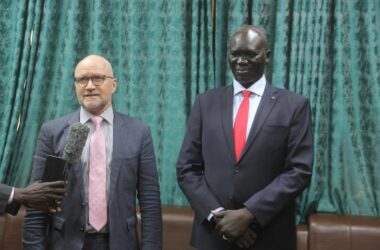By Bida Elly David
Minister of Petroleum, Puot Kang Chol, has singled out operating petroleum companies, accusing them of engaging in employment malpractices.
According to the minister, three petroleum consortiums operating in South Sudan’s oil and energy sectors do not comply with the country’s Petroleum and Labour laws when recruiting workforce.
The minister was responding to inquiry on recruitment malpractice raised by national lawmakers during summons on Tuesday.
In a candid manner, the minister said Greater Pioneer Operating Company, Dar Petroleum Operating Company, and Sudd Petroleum Operating Company, operate without internal recruitment policies.
“These companies continue to recruit employees throughout the years. These recruitment processes sometimes are not in compliance with the established laws,” the minister stated.
South Sudan Petroleum, Labour, Production, and Exploration Acts are the instruments provided in the by law to guide recruitment of employees in the oil and energy sectors.
Mr. Kang said, the ministry found that recruitment and governance systems within the three companies have been managed on a departmental basis with numerous irregularities and malpractices.
The findings also showed unequal regional representation as well as unfair career progression programs being followed by the companies based on who you know best to employ.
The assessment conducted by the ministry focused on organizational structures, employment processes and practices, academic qualifications and job descriptions in relation to international standards.
Other included best practices in the petroleum sector and compliance with all established laws, such as the transitional constitution and the Petroleum Act.
However, the minister noted that recruitment malpractices were stopped through a ministerial order directing the operating companies to suspend all employment until further directives are issued.
In a statistics presented of employees in each of the three petroleum consortiums across the country, some states have been cheated while others take the lion’s share.
“In DPOC, Upper Nile has 174 employees: Western Bahr-el-Ghazal 21, Jonglei State 38, Lakes State 40, Central Equatoria 62, Eastern Equatoria 9 staff, Unity State 19, Warrap 39, Northern Bahr-el-Ghazal 13, Western Equatoria State 9, and Abyei 2,” he disclosed.
Moreover, the minister noted that Pibor and Ruweng administrative areas were put together as part and parcel of Unity and Jonglei States.
“In GPOC Unity State 91 staff, Central Equatoria State 57, Upper Nile 40, Warrap 30, Western Bahar el-Ghazal 16, Western Equatoria 15, Eastern Equatoria 13, Northern Bahhr-Al-Ghazal 12, Jonglei 7, Lakes 6, Jonglei 1,” statistics shown
In continuation, Unity State takes the lead in the statistics of employment at SPOC Petroleum Company with a total of 68 employees.
“We have SPOC Upper Nile 21, WBS 7, Jonglei 14, Lakes 3, CES 15, EES 9, Unity 68, Warrap 7, NBS 1, WES 5, Abyei 5,’’ the list reads.
Minister Kang highlighted that the ministry is going to conduct an in-depth employment assessment in all JOCs to beef out those who don’t abide by the policies.
He stressed that the Ministry of Petroleum will not tolerate any sort of employment malpractice that will spoil the reputation of the government at all levels, noting that acts of fairness should be a priority.
However, other human resource agencies have developed a policy manual that highlights and educates all employees about their individual and collective rights as well as their obligations to companies.
All aspects of recruitment processes from advertising, candidate screening, provisional period, promotion, training, public holidays, performance appraisal, working hours, employee behavior, over-time medical insurance, and coverage schemes are manned by Human resource policies.
The minister said that the introduction of the manual in 2021 has helped the ministry control unnecessary malpractices within the petroleum companies.
DPOC, GPOC, and SPOC have, however, yet to respond to the minister’s report to parliament on their recruitment malpractices.




